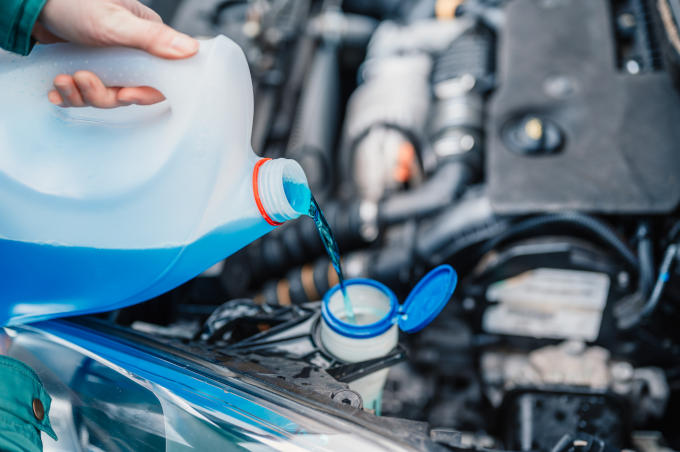If you want to keep your vehicle in the best condition possible in Southern California, it is essential you understand your vehicle fluids and their roles in keeping your ride on the road. In this blog, we explore the most critical fluids and the signs that indicate you might need to top yours up.
Vehicle fluids are essential for keeping your vehicle and engine working effectively. From coolant and transmission fluid to windshield fluid and engine oil, these lubricants help to prevent wear, boost performance, and increase safety.
However, despite the vital role that these vehicle fluids play, many drivers are not aware of the essentials or the signs that they might need to top their vehicles up. That is why we have taken a closer look at the most important to help you keep your pride and joy in the best condition possible.
Essential Vehicle Fluids You Need To Know
Many fluids work together to keep your vehicle on the road, but six of the most essential include:
Engine Oil
Engine oil is one of the most critical vehicle fluids to be aware of. It is effectively your vehicle lifeblood, helping reduce friction within the engine and ensuring that it is running efficiently at the optimum temperature. Keeping an eye on the level and quality can also help reduce the risk of low oil and depleted oil clogging oil passages which are the leading causes of severe engine damage.
The most common indication that you may have a major oil related problem is seeing a warning light appearing on your dash. However, you may also hear a strange knocking sound, a burning smell, lack of power, or even notice lower fuel efficiency.
Making sure you know the most common signs of low engine oil is essential to keep your vehicle safe and working as designed. Driving without the recommended fluid level can cause engine parts to wear far quicker, while driving without any engine oil could cause severe damage, even to the point of the engine seizing up, requiring major repairs up to and including a complete engine replacement.
Transmission Fluid
Another vital vehicle fluid is your transmission fluid. This serves a similar role to your engine oil by working to provide hydraulic pressure to operate, and also lubricate, protect, and cool your vehicle’s transmission. This ensures that your transmission engagements and shifts are smooth and on time, which will also cause less stress on your engine.
Some manufacturers make claims that their transmission fluid can last a lifetime of use, while other transmission fluid providers state anywhere from 30,000 to 100,000 miles change intervals depending on how and where you drive. Check your owner’s manual to find the best recommendations for your vehicle’s make and model.
However, regardless of the maintenance recommendations of mileage, it is important to monitor your fluid levels and react accordingly. Certain signs to look out for indicate you might need to replace yours sooner, including noticing unusually dark fluid, low fluid, difficulty shifting gears, shuddering or lurching, or even a strong odor (such as a burning smell) coming from the vehicle.
However, these signs can also indicate any number of problems with your transmission, so it is important to bring your vehicle to a repair technician that specializes in transmission services. These trained transmission mechanics have the necessary knowledge, experience, and equipment to correctly diagnose and service your transmission. Transmission experts can ensure that the correct type and amount of fluid is used, and that the transmission is properly sealed and functioning after the fluid change. In addition, a transmission expert can also check for any potential issues or leaks and make necessary repairs, which can extend the life of your transmission and prevent costly transmission damage in the future. The transmission is among one of the most complex and expensive components in your vehicle, so having it properly serviced by the proper technician and facility that specializes in transmissions is critical to its health and lifespan.
Coolant
Driving your vehicle creates a lot of heat, and temperatures inside your engine and transmission will typically reach over 200 degrees. Coolant is an essential fluid designed to control your engine and transmission’s temperature. In addition to cooling your engine, there is typically a transmission cooler built inside your radiator that uses the surrounding coolant to keep your transmission cool.
There are many reasons why your coolant levels may be lower than they should be, but it is almost exclusively due to a leaking cooling system. For example, this could come from a leaking hose, clamps, sensors, cracks or defects in the engine block or heads, a leaking radiator core or heater core, or the various gaskets and seals throughout the engine. It is crucial to identify where the leak is coming from to prevent continuously topping up your vehicle fluids.
Topping up your coolant levels is a very straightforward process and can be done at home, but it is not solving the leak. One of the biggest consequences of driving with low engine coolant is your engine and transmission overheating, which, if left unchecked and unrepaired, can result in a damaged engine block, blown head gasket, and even a damaged transmission.
Brake Fluid
Your brakes are one of the most critical safety components of your vehicle, which means having the correct brake fluid levels is essential. This critical hydraulic fluid is the force that applies the pressure on the brake pads when you press on the brake pedal and allows the effortless slowing or stopping of your vehicle.
While this fluid is designed to last for quite a while, it is hygroscopic and attracts moisture, which causes corrosion and contamination. Changing your fluid as per the manufacturer’s recommendation is a smart maintenance service. If your brake light is illuminated, there are certain reasons that might cause this issue and that is typically low fluid or low brake friction. The most common problem is that there is a leak somewhere in the hydraulic system. However, the system could also experience a decreased level of fluid due to worn brake pads or a damaged brake line or hose. If you find that it is becoming harder to brake or that your pedal feels low or mushy, it could indicate you need to check for low fluid, low brake pads. It may also be time to replace your vehicle brake fluid for fresh fluid.
Driving without the correct brake fluid or low levels can be incredibly dangerous and result in complete brake failure.
Power Steering Fluid
Power steering helps to make turning your vehicle steering wheel effortless, giving you greater control and handling while driving. Power steering fluid plays a vital role in this system, providing the hydraulic fluid needed for the system to operate, lubricating the internal moving parts of the steering gear, suppressing foaming (caused by air within the system), and helps cool your power steering gears and pump.
There are many indications that your power steering fluid requires servicing and perhaps replacement. The first is noticing your steering has an audible whine when you turn the steering wheel. You might also spot a visible leak under the vehicle or feel vibrations through the steering wheel coupled with strange noises.
Trying to drive without power steering fluid can be extremely dangerous. Not only will it make steering much more difficult, but it could also result in a complete loss of control.
Washer/Windshield Fluid
Finally, you want to ensure that your windshield fluid is topped up. Visibility is essential when driving. Any debris, dirt and grime blocking your view can be hazardous.
However, along with cleaning your windshield, this fluid also helps to lubricate the pump and hoses, preventing metal parts from corroding and any rubber parts from degrading. Thankfully, topping up your windshield fluid is quite easy to do, and anyone can do this at home. Take heed to only use windshield washer fluid that has a freeze protection additive as that will ensure your fluid flows in the cold freezing weather when you most need it.
Need Help with Your Vehicle Fluids?
Vehicle fluids are essential in keeping your vehicle working as efficiently as designed and ensuring you, your passengers, and other road users are kept safe. Regularly checking your fluid levels will also help reduce wear and tear on parts, extend the life of your components, and reduce the risk of a breakdown, accident, or expensive repairs.
Our experienced technicians will be able to quickly identify what maintenance is due on your vehicle, or what could be causing your vehicle to behave differently. We’ll recommend the right fix that will allow you to get back on the road as soon as possible. Contact a Southern California AAMCO Center near you!
AAMCO has more than 60 years of experience diagnosing, servicing, and repairing more than 20 million vehicles. Customers rely on us for:
- Quality repairs
- Expert technicians
- Superior customer experience
- Trustworthy, honest service
- Best warranty coverage available
AAMCO Centers of Southern California and surrounding areas represent trust, quality, and value

 Schedule Appointment
Schedule Appointment















